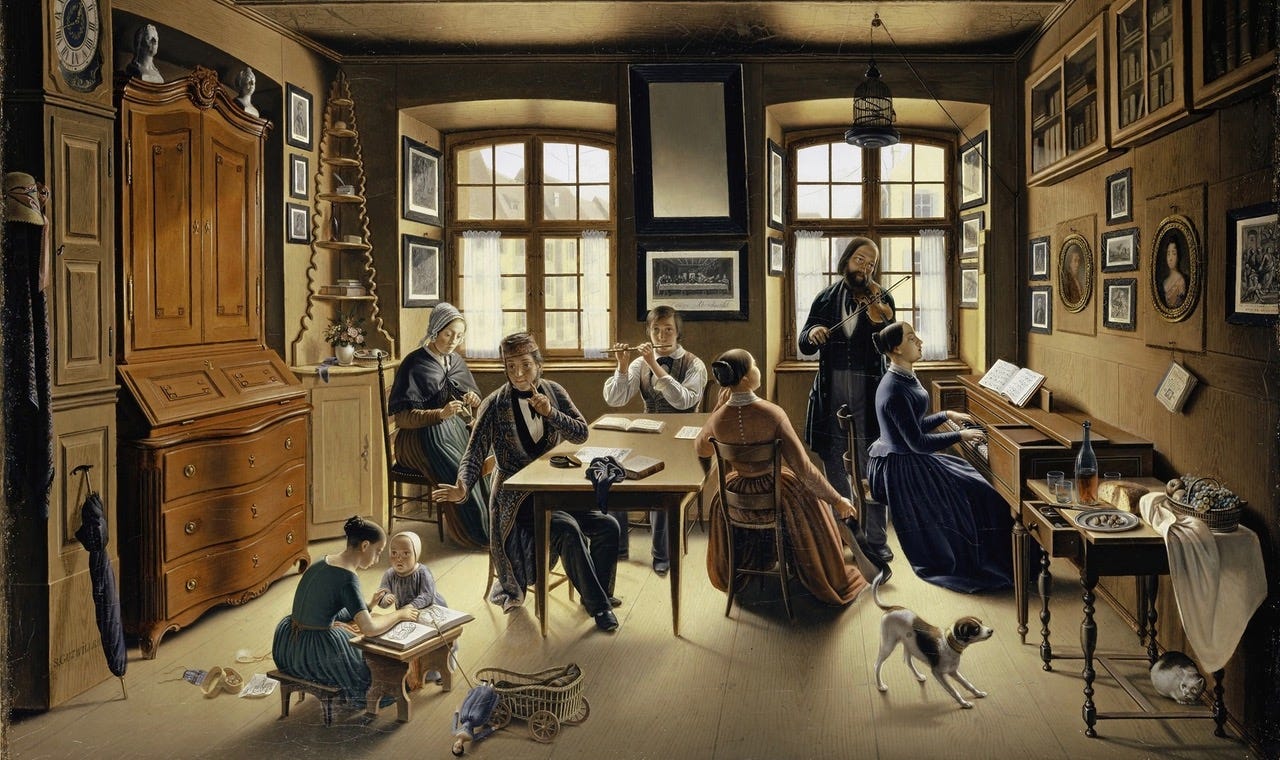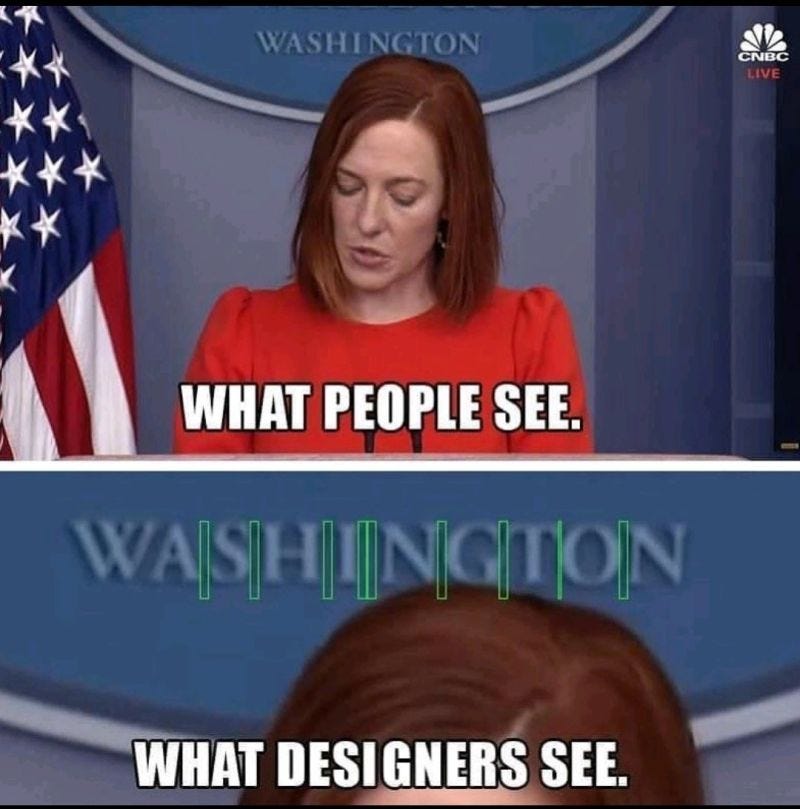
In the photo, former White House Press Secretary Jen Psaki stands in a briefing room, the word “WASHINGTON” in bold letters behind her head. “Every designer I know can’t unsee this,” my former co-worker, Crystal, wrote on LinkedIn.
Because Crystal pointed it out, I could see that the lettering was off, with too much space on both sides of the “I.” Still, it looked basically OK to me. But to Crystal and her fellow graphic designers, it was a mess.
The meme works because it underscores a distinction that has blurred in the media world over the past two decades—the difference between a professional and an amateur.
You see, I do a little graphic-designing myself. After a lot of trial and error, and an $8 teaser subscription to Canva, I created my newsletter logo. I think it looks pretty good, but I wouldn’t want to know what Crystal or any other graphic designer thinks of it. (Seriously, don’t tell me. I don’t have the time or resources or skill to do any better.)
I’m also hoping my friend David never listens to my “podcast.” David is a real podcast producer who works for NPR. I’m posting mostly raw audio of my interviews as bonus content for paying subscribers. (With a lot of help from my husband, who is using Audacity to adjust sound levels and clean up some of the more egregious “likes” and “you knows.”)
Since I started this newsletter, I’ve enjoyed teaching myself how to be a graphic designer, art director and podcast producer. It’s interesting and fulfilling and probably better for my aging brain than Wordle.
But I also know that by doing this, I’m contributing to the amateurization of Crystal’s and David’s professions. And that bothers me, because I know what it’s like to be on the other side.
The first year I ever earned money as a writer, I told my accountant that my total deductions—newspapers, internet, laptop—were higher than my $2,000 of freelance-writing income. So I’d earned that money free and clear, on top of my day-job salary.
“You can do that for two years, and then you can’t do that anymore,” he said.
“Why not?”
“Because then it’s not a business. It’s a hobby.”
A couple of years later, I earned enough from magazine work to quit my day job and write full-time—to make it a business, not a hobby. I now see that this was only possible because it was the late 1990s, a time when a middle-level freelance writer—someone with no name, no book, and no affiliation with a prestigious institution—could pay all of her monthly bills with a single magazine piece. In 2000, my rent in Brooklyn was $950 a month and I made between $1,500 to $4,000 per story.
Through the aughts, pay rates steadily declined, but I still did OK because I worked faster, and editors were less demanding—the $4,000 story came with several rewrites; editors generally accepted the $500 piece without much fuss.
Then, in 2010, three different editors declined my pitches with the same, chilling sentence: “We have bloggers who will do that for free.”
There is, of course, a big systemic-change story here. With internet journalism, the ad-revenue structure changed completely. The publications that had paid me so well in the 1990s launched their online platforms and paid a fraction of their print rates. A few months ago, an editor at Cosmo tweeted that the publication was paying $1.50 to $2 a word for a story. That’s what Cosmo and other women’s magazines paid me in 2000, but 24 years later the tweet was greeted with great enthusiasm for the high pay.
So, sure: It’s not me. But it’s hard not to take things personally when someone says, “Your work is worth $0.”
I thought about finding a new line of work—getting a social-work degree, or a Realtor’s license. But I had one final pitch. I wrote and then published a 1,500-word essay in a big publication ($300) that went extremely viral and landed me a book advance ($20,000).
Publishing a book was extremely fulfilling and fun, and I eventually earned enough in royalties ($30,000) and film and television options ($15,000) to meet my accountant’s definition of a business.
But the larger, systemic damage was done.
Today I support myself with ghostwriting and other unbylined gigs. The pay rates are stuck in the 1990s—in real dollars, not adjusted for inflation—but today 1990s pay is exceptional.
And I do this newsletter. Since I started it nine months ago, readers have paid a total of $2,4511 for this work. After $680 in Stripe and Substack fees and the $300 I’ve paid to guest writers so far, my current total before taxes is $1,471. Definitely a hobby. But I enjoy it, and I’m an American so I cling to the dream that I can one day turn it into a business.
A few months ago, an editor at Cosmo tweeted that the publication was paying $1.50 to $2 a word for a story. That’s what Cosmo and other women’s magazines paid me in 2000, but 24 years later the tweet was greeted with great enthusiasm for the high pay.
For a long time, I was mad at those 2010 bloggers who undercut me by doing my job for free.
But they were just doing what the system told them to do.
They were getting their names out, building their brands and their businesses. For me, writing was a living; for them, it was a promotional expense.
Now I’ve joined their ranks, providing free (or mostly free) content in the hopes of building an audience. I enjoy producing this newsletter. I like following my interests without worrying about selling an editor on an idea first, and I love connecting directly with readers. But I miss editors—the good ones can push you to make a piece stronger. Because they’re professionals, and that’s their job.
I also can’t shake the feeling that I’m surrendering to a system that killed my livelihood and is now going after my friends’ paychecks.
I spoke to sociologist Patrick Sheehan about this, and published an interview with him earlier this month. Patrick, a post-doctoral fellow at Stanford University, described the relatively new phenomena of white-collar layoffs and the bizarrely inadequate services that corporations and government agencies provide the unemployed—job clubs where fiftysomething former tech executives are taught to do power poses and make vision boards. Patrick noticed that many of the “experts” giving advice to the unemployed were job-hunting themselves, and he has conducted extensive research on how the lines between amateurs and professionals have blurred over the past 50 years.
At the end of the interview, I mentioned my ambivalence about my amateur podcasting and graphic-designing. He assured me that the problem was a lot bigger than me, or Substack. “This de-professionalization is a huge part of the transformation of work over the past several decades. It has happened to all kinds of professions, academia being one,” he said in the part of the interview that I paywalled.
Since the mid-20th century, he explained, economic risk has shifted from businesses to workers. The old days of secure employment are gone, and now even people with salaried jobs at profitable companies work under the threat of layoffs—which have proven an effective tool for driving up stock prices. The 20th-century “company man” model is history. Workers today are encouraged to see themselves as entrepreneurs, building their personal brands and peddling their skills from job to job.
“Everyone’s got to hustle now. It’s not really a choice,” he said.
But he had a caveat. We might have to participate in this system, but we can still be critical of it and even work to upend it. Trying to build a business through a Substack newsletter is fine, he said, but it would be a problem if I became an advocate for the platform. “If you become, as the kids say, a stan for Substack, a real fan of it. If you just cheered it on, ‘I'm loving my thing at Substack. It’s the best career move ever. Thank you, Substack’ … then you are becoming a little servant of the order,” he said.
In 2010, three different editors declined my pitches with the same, chilling sentence: “We have bloggers who will do that for free.”
For his part, David says he doesn’t begrudge my amateur podcasting, and points out that the medium started as a homegrown endeavor before traditional media got into the game.
That perspective helps—especially since I’m going to keep doing this.
We all have to live in this world, in a system that blazes down the profit-seeking trail without regard for those left in its wake. We all have to make difficult ethical and moral choices about the ways we conduct ourselves under these circumstances.
I am compromised—by my desire for a secure retirement, a nice home, and dinner and a movie on the weekends. I don’t want to give these things up, so I will keep hustling. I will call for collective solutions to big, systemic problems while hawking my personal brand. Rather than fight this contradiction, I’m going to try and embrace it.
Maybe we all have to hustle, but we can find solidarity with each other and keep the bigger picture in our sights. Maybe we all have to play the game, but we don’t have to let the game play us.
How has your profession changed since you started out?
These numbers were updated on Feb. 1. Now that I’m calculating these payments for tax purposes, I see that my guesstimate on the Substack and Stripe fees was WAY off—it’s $680, not $300. These updated numbers also reflect payments I’ve received since the initial post, including two new paying subscribers. Thanks, Elizabeth and Jesse!






When I started as a film and TV editor, the technology we used was prohibitively expensive and/or complex. You had to train and know how to use it, and we were paid for that expertise. But also the very complexity of it built in a kind of breathing room. You weren't able to do everything quickly (you had to track all the small pieces of film you cut out! Or you had to load footage in real time, playing it down and digitizing it into the computer as you watched!) This allowed you time to think. What stories do you want to tell? What's the best moment?
As the tech got less expensive/more accessible, more and more people knew technically how to put two shots together, and make it look finished. What we editors do--tell stories, build character--became less valued than how fast we could make something look polished, which now many people now have the tools to do. Schedules have been progressively shorter and shorter, and as we are generally paid by the week, our pay for finishing a project has gotten lower and lower. And we've lost the time to craft stories well.
It seems to me that writing has become more amateur in general. I notice so much work clearly in need of an editor. So much copy, even — the top brands use copyeditors and it shows. Many brands don’t and that, too, shows.
Books seem edited less well. There’s so many “that”s instead of “who”s, so many small errors that once would’ve been corrected. Maybe it’s the proliferation of social media and therefore writing in general—the more it amasses, the more junk we are likely to see.
I edit a lot of academic work. That’s definitely an industry where you still cannot publish garbage writing, but the entire profession has certainly been amateurized.